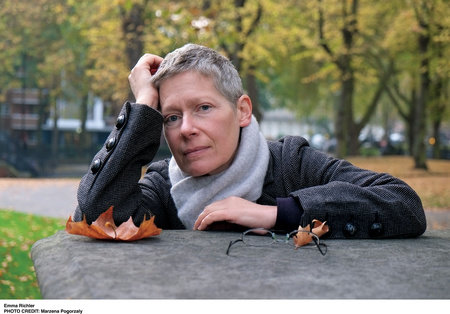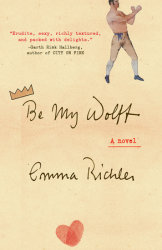Emma Richler is an expert at capturing the quirks and inner-workings of family dynamics. Her 2005 autobiographical novel Feed My Dear Dogs introduced readers to the Weiss family, a collection of five colorful siblings bouncing like charged particles off one another as their parents Yaakov and Frances relocate the family to Canada.
In Richler’s latest, Be My Wolff, her story is broad and bounding in its Dickensian scope as the lead characters — Zachariah and Rachel — navigate their unusual relationship: Zach is Rachel’s adopted brother. He’s also her lover.
In our latest installment of Behind the Books, Emma discusses her writing habits, the alchemy of experience, her flights of imagination, and some sound writing advice: if you think what you’ve written is good, my father used to say, then you know it is time to revise.
PENGUIN RANDOM HOUSE: What’s your writing routine? Where, when, and how does it happen?
Emma Richler: My writing routine seems to vary book to book, but it always involves daily work. The hours of sitting down to write may vary, as well as the length of the sessions, but I prefer consistently to work at home and in as complete a quiet as I can achieve in a flat in London. I do a lot of preliminary drafts in my head and when I am more or less ready to commit it to paper, I sit down. I write at a desk, on my bed, on a small oak table in front of the sofa, or in an armchair. I write by hand with a fountain pen or a black Pilot V-ball 0.5 tip.
PRH: What writers have influenced you most?
ER: I can’t really say. There are many writers I admire and enjoy, but I don’t count any as influences in terms of style or content. I can only write in my own voice, according to the tone of each novel at the time. If there are influences, I don’t know them. If they are there, they are wholly unconscious.
PRH: To what extent does your writing reflect your own life story?
ER: A writer works with imagination. I do. Experience is a springboard. The rest is a kind of alchemy. My life has to be in my work, by necessity, but in forms I may not recognize. Some things may be easily and deliberately autobiographical, but these are usually details – things to do with physicality, furniture, sometimes landscape. My world is very much imagined. My sensitivities and experience might take me there, but the destination is unknown to me at the outset.
PRH: Do you actively search for your next book subject, or does the subject “choose” you?
ER: I tend to receive visitations…I don’t choose a topic and go about researching it. A voice comes into my head, or an image, or an obsession. That’s the start of the thing.
PRH: What book (fiction or nonfiction) helped you see the world in a different light?
ER: I read Mark Cocker’s Crow Country last year. I see crows every day on my walks and have always been struck by them, but this book intensified my attraction to crows. I do not see whales every day, but I also read Philip Hoare’s Leviathan last year and I certainly see whales in a different light, albeit largely in my mind’s eye. Marvelous books of all kinds magnify my world, though I don’t know that the light changes much.
PRH: Faulkner said a writer needs three things: experience, observation, and imagination. Do you use all three equally, rely on one over another, or toss out that framework altogether?
ER: I need all three, but imagination is the biggie. It doesn’t work without the other two. Experience and observation, these are the machinery. The gears for flight. Imagination is the flight. I’d add a fourth requirement to that list, and that is money. A room of one’s own, as Virginia Woolf called it. The bills must be paid. Heat, light and food, these are good tools, too.
PRH: To the aspiring writer, what advice would you give? What advice helped you become the writer you are today?
ER: A writer writes, my mother tells me. Write. And another thing; if you think what you’ve written is good, my father used to say, then you know it is time to revise.













